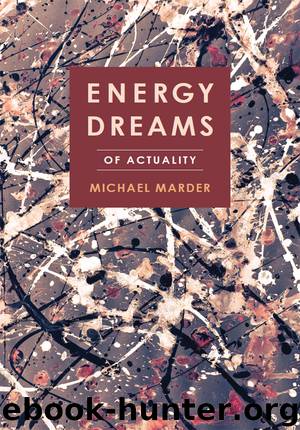Energy Dreams by Marder Michael

Author:Marder, Michael.
Language: eng
Format: epub
Tags: PHI027000, Philosophy/Movements/Deconstruction, PHI002000, Philosophy/History & Surveys/Ancient & Classical
Publisher: Perseus Books, LLC
Published: 2017-03-13T16:00:00+00:00
The problems of ancient psychology I have raised here are still our problems, not because nothing has changed in human subject-formation over the period that has elapsed between Plato or Aristotle and us, but because, like them, we have no means of enunciating psychological insights other than by and through the psyche. The subject matter of psychology is inseparable from its object of study, which is the subject: the working and the work proceed in tandem, completing an energetic circle. Indirectly, in his “economic” theory of the drives and in the elaboration of conscious and unconscious topographies, Freud, too, salutes Greek thought for the unrivaled attention it has paid to both modalities of psychic energy. Psycho-analysis is an exceptional legatee eager to retrace the outlines of psychic schisms in its very method, an inheritor of ancient psycho-logy who transcribes its logos into the language of analysis, palatable to post-Kantian philosophy. Out of fidelity to the Delphic injunction Know thyself! that condenses the entire energy of Greek psychology, Freud makes self-analysis a cornerstone of his clinical procedure and theoretical investigations. In this, his method radically deviates from behaviorism and, more so still, from the statistical techniques determining the contemporary shape of the discipline that prefer to forget about the existence of a psyche and to replace it with actual behavioral patterns or their average distributions in a population. A psychology without a psyche and without logos, without the discourse of the psyche by and on itself (I hesitate to write “a psychology without a soul,” resorting to a phrase that could be perversely understood as a nostalgic tribute to an old theological and metaphysical category), ours is a psychology whose energy has been sapped. In the absence of its object of study, which is also its subject, let alone a method that would lead toward or from—from-toward—the psyche, psychology functions nowadays without working and without work, so much so that it forecloses the potentialities of self-knowing. It is for this reason that I turn to psychoanalysis for a reinvigorated approach to (and of) psychic energy.
The Freudian psyche is divisible and divided, and its study needs to be analytical to remain faithful to that irreducible fissuring. This axiom applies not just to the major partitions of psychic topography—the system Cs./Uncs. or its later mutation into the tripartite structure of id-ego-superego—and not just to the inner differentiation of libidinal energy, distributed according to the intensities of its attachment to an object (cathexis), but also to “primary” processes, notably infantile narcissism. Rebuffing the assumption that at the early stages of its development the psyche (that is to say, psychic energy) is undifferentiated, Freud humbly accepts the inadequacies of analytic devices in discriminating between fine-grained libidinal clusters: “Finally, as regards the differentiation of psychical energies [die Unterscheidung der psychischen Energien], we are led to the conclusion that to begin with, during the state of narcissism, they exist together and that they are undifferentiated for our coarse analysis [und für unsere grobe Analyse ununterscheidbar sind]; not
Download
This site does not store any files on its server. We only index and link to content provided by other sites. Please contact the content providers to delete copyright contents if any and email us, we'll remove relevant links or contents immediately.
Whiskies Galore by Ian Buxton(41972)
Introduction to Aircraft Design (Cambridge Aerospace Series) by John P. Fielding(33108)
Small Unmanned Fixed-wing Aircraft Design by Andrew J. Keane Andras Sobester James P. Scanlan & András Sóbester & James P. Scanlan(32781)
Craft Beer for the Homebrewer by Michael Agnew(18220)
Turbulence by E. J. Noyes(8008)
The Complete Stick Figure Physics Tutorials by Allen Sarah(7358)
Kaplan MCAT General Chemistry Review by Kaplan(6917)
The Thirst by Nesbo Jo(6913)
Bad Blood by John Carreyrou(6602)
Modelling of Convective Heat and Mass Transfer in Rotating Flows by Igor V. Shevchuk(6422)
Learning SQL by Alan Beaulieu(6265)
Weapons of Math Destruction by Cathy O'Neil(6250)
Man-made Catastrophes and Risk Information Concealment by Dmitry Chernov & Didier Sornette(5982)
Digital Minimalism by Cal Newport;(5740)
Life 3.0: Being Human in the Age of Artificial Intelligence by Tegmark Max(5534)
iGen by Jean M. Twenge(5399)
Secrets of Antigravity Propulsion: Tesla, UFOs, and Classified Aerospace Technology by Ph.D. Paul A. Laviolette(5359)
Design of Trajectory Optimization Approach for Space Maneuver Vehicle Skip Entry Problems by Runqi Chai & Al Savvaris & Antonios Tsourdos & Senchun Chai(5056)
Pale Blue Dot by Carl Sagan(4986)
